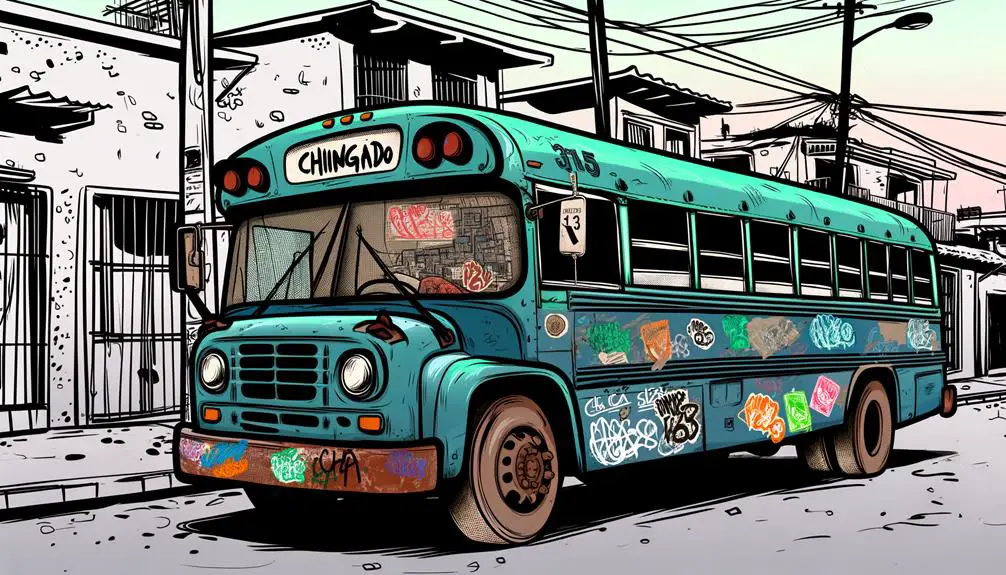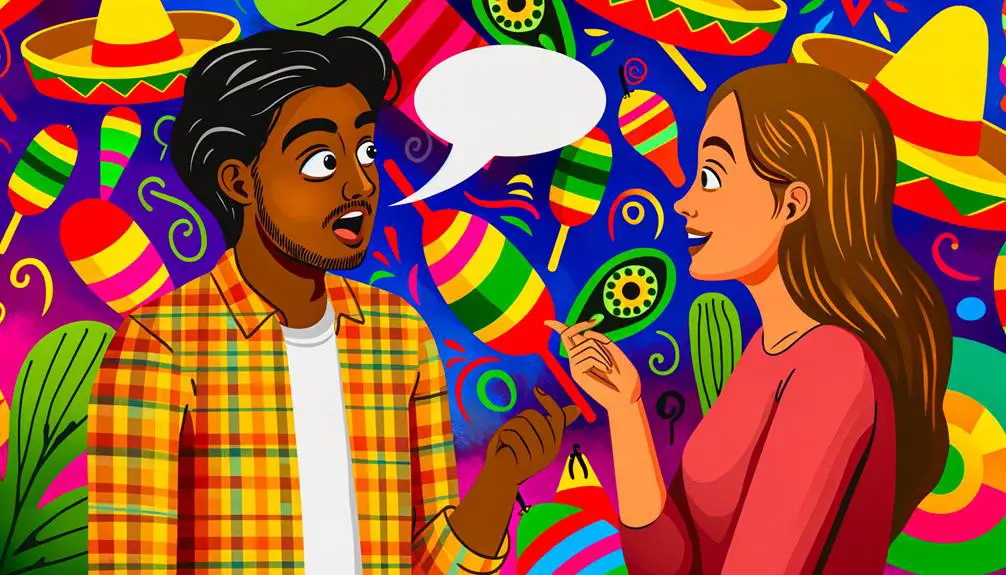When you encounter 'chingado' in Spanish slang, you're witness to a complex emotional release, born from Mexico's 19th-century working-class experiences, that can convey frustration, disappointment, or resignation, and is now woven into everyday conversation across Spanish-speaking countries. This versatile term has a vast emotional range, expressing everything from minor annoyances to crises, and is a significant part of cultural identity. It's not just a generic curse word, but a nuanced expression that differs across regions. As you explore further, you'll uncover the complexities and regional variations of chingado, and gain a deeper understanding of its cultural significance.
Origins of Chingado in Mexico

In Mexico, where the term 'chingado' originated, it's believed to have emerged as a slang expression in the 19th century, particularly among the working class and peasants.
You might wonder why this term gained traction in this demographic. The answer lies in Mexican dialectics, which often reflects the cultural and social context of the time.
During the 19th century, Mexico was still reeling from the colonial legacy of Spanish rule, which had a profound impact on the country's language, culture, and social hierarchy.
As a result, the working class and peasants, who were often at the bottom of the social ladder, developed their own dialectical expressions to cope with the harsh realities of their lives. 'Chingado' likely emerged as a way to express frustration, anger, or disappointment in the face of oppression and marginalization.
This slang term became a powerful tool for the marginalized to articulate their emotions and dissent in a society that often silenced their voices. By examining the origins of 'chingado' in Mexico, you gain insight into the complex dynamics of power, resistance, and identity that continue to shape Mexican culture today.
Emotional Range of Chingado
You'll find that the emotional range of 'chingado' is surprisingly vast, spanning from frustration and disappointment to annoyance and even resignation. This versatility in conveying emotional intensity is a hallmark of the term's cultural significance in Spanish slang.
When you use 'chingado', you're not just expressing frustration; you're conveying a sense of exasperation that borders on despair. The term's emotional range is so broad that it can be used to describe everything from a minor inconvenience to a full-blown crisis. This adaptability has contributed to 'chingado's' widespread adoption in everyday conversation.
Its cultural significance lies in its ability to capture the nuances of human emotion, making it a powerful tool for self-expression. As you explore the emotional range of 'chingado', you'll discover that it's more than just a swear word – it's a window into the complexities of the human experience.
Using Chingado in Everyday Speech

When maneuvering through everyday conversations, chingado seamlessly integrates into informal dialogue, allowing speakers to express frustration or disappointment without hesitation.
You may find yourself using chingado in casual conversations with friends or family, but it's important to understand its limitations in formal settings.
In informal settings, chingado can be used to add emphasis or convey emotions. For example, 'Estoy chingado de cansado' (I'm damn tired) or 'Este tráfico está chingado' (This traffic is damn awful).
However, it's important to maintain a formal tone in professional or academic settings, avoiding the use of chingado altogether.
Regional Variations of Chingado
What regional twists can you expect to encounter as chingado travels across different Spanish-speaking countries and cultures? As you explore the variations of chingado, you'll notice that each region puts its unique spin on this versatile slang term.
In Argentina, for instance, you'll find Argentine nuances that infuse chingado with a distinct flavor. Here, it's not uncommon to hear chingado used as an intensifier, amplifying the emotional impact of a statement.
In Chile, the Chilean adaptations of chingado take on a more playful tone. You might hear it used to express excitement or surprise, similar to 'wow' or 'damn' in English.
Meanwhile, in other Latin American countries, chingado takes on different connotations, from being a mild oath in some places to a more serious insult in others.
As you navigate the regional variations of chingado, remember that context is key. Understanding the local culture and nuances will help you use chingado like a native, avoiding misunderstandings and miscommunications.
Misconceptions About Chingado

Despite its widespread use, chingado is often shrouded in misconceptions, which can lead to miscommunication and awkward situations. You might think you're being cool by throwing around 'chingado' in casual conversations, but are you really using it correctly?
One common misconception is that chingado is a generic Spanish curse word, but it's not that simple. In some regions, chingado is a mild expression, while in others, it's considered highly offensive. Cultural appropriation can be a problem when non-native speakers adopt the term without understanding its nuances.
Language barriers can also lead to misunderstandings, as chingado doesn't have a direct English translation. You might unintentionally offend someone or come across as insensitive. It's essential to recognize these misconceptions and approach the term with cultural sensitivity.
Frequently Asked Questions
Is Chingado Only Used in Informal Settings?
You might assume that certain words are only used in informal settings, but that's not always the case. While it's true that some words are reserved for casual conversations, there are formal exceptions.
For instance, regional variations can influence how and when certain words are used. In some regions, words considered informal elsewhere might be used in formal settings. It's essential to understand these nuances to effectively communicate across different contexts.
Can Non-Native Speakers Use Chingado in Conversations?
As you explore the world of foreign languages, you'll encounter a delicate dance of cultural sensitivity. When wondering if you, as a non-native speaker, can use certain expressions, you must tread carefully.
Using phrases like 'chingado' without understanding the cultural context can be seen as cultural appropriation.
Don't let language barriers fool you – understanding the nuances of a word's connotation and history before incorporating it into your conversations is crucial.
Is Chingado Similar to Other Latin American Slang Words?
As you explore Latin American dialect variations, you'll find that Chingado's etymology sets it apart from other slang words. While it shares similarities with words like 'coger' or ' huevón', its unique blend of indigenous and Spanish influences makes it distinct.
In countries like Mexico, Chile, or Argentina, you'll encounter similar words, but Chingado's cultural significance is unmatched, reflecting the complex history of its region.
Can Chingado Be Used as an Adjective or Adverb?
When you explore the versatility of slang terms, you'll find that some can adapt to different grammatical roles. In this case, you're wondering if a specific term can be used as an adjective or adverb.
Formal nuances often blur the lines between parts of speech. As language evolves, words can take on new functions.
In linguistic evolution, context and usage dictate how terms are employed.
Is Chingado Offensive to Older Generations in Mexico?
Imagine walking through a vibrant Mexican market, surrounded by colorful piñatas and lively mariachi music. Now, picture the looks on older generations' faces when they hear the word 'chingado' – a mix of discomfort and disapproval.
You're witnessing intergenerational conflict, where cultural sensitivity is put to the test. To them, this word is a symbol of disrespect, a reflection of the younger generation's lack of decorum. Yes, 'chingado' can be offensive to older Mexicans, who value tradition and respect.







